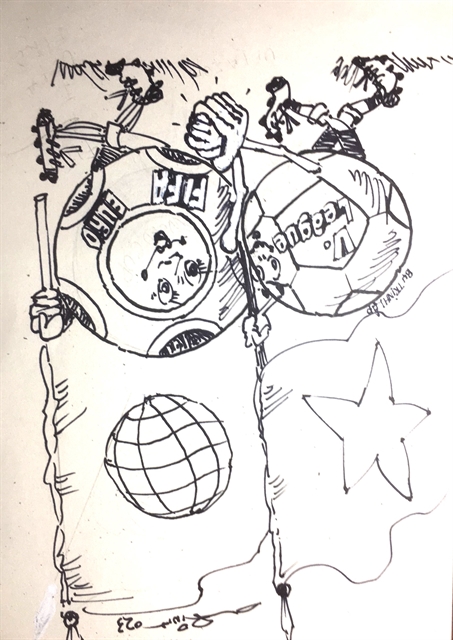 Talk Around Town
Talk Around Town


|
| Illustration by Trịnh Lập |
By Thanh Nga
The 2023-24 season marks a significant milestone for Vietnamese football as it adopts a new format, aligning its schedule with renowned leagues like the English Premier League. The season will span from autumn to summer, offering an extended timeframe for competition.
The 2023-24 national championship, known as V. League 1, is set to start on October 20, and conclude on June 30, 2024. Concurrently, the First Division tournament, V. League 2, will kick off in October and span a two-year period. Moreover, the 2023-24 National Cup will begin on November 24 and culminate with the final match on July 7, 2024.
Over the years, conflicts between the schedules of V. League 1 and the national teams have persisted and grown increasingly problematic. This has posed a considerable challenge for football managers when it comes to match scheduling.
Consequently, Vietnamese football has embraced this new format, mirroring the duration of renowned leagues such as the English Premier League and the Spanish La Liga, thereby aligning with global football.
This pivotal change signifies the Vietnamese national premier league's transition towards the European model. The modification was initiated following a request from the Asian Football Confederation (AFC) to harmonise with the schedules of national football tournaments in the regional and international norms.
This adaptation represents a sensible solution that balances the interests of both parties while simultaneously promoting the development of domestic tournaments and ensuring the strength of the Vietnamese national team. While the national team are the epitome of football performance, V. League 1 serves as the solid foundation of the country's football.
The change of the competition schedule will facilitate Vietnamese clubs and national teams' participation in the AFC and FIFA international competition systems.
This unprecedented change holds the promise of minimising the adverse impact of the international competition schedule on Việt Nam's premier football tournament.
This transformation will unlock significant opportunities for Vietnamese professional football. Notably, the V. League 1 will no longer need to pause for events that have historically clashed with FIFA's programme.
Consequently, clubs will no longer find themselves in situations where players who have only participated in a few matches must be benched to accommodate national team duties, including young teams like Việt Nam's U20 and U23 squads.
Moving forward, V. League 1 will solely make way for FIFA Days and major national team tournaments, ensuring a more streamlined football calendar.
Nguyễn Minh Ngọc, the general director of the Việt Nam Professional Football JSC, said that adhering to the agreed timeframe with the AFC and Europe would contribute to a more vibrant domestic transfer market.
Vietnamese players will have more opportunities to play abroad as the transfer windows in Việt Nam and overseas will overlap.
On the contrary, V. League 1 clubs will have the chance to select high-quality foreign players to enhance their strength, thereby boosting the competitiveness of the tournament. Furthermore, a highly synchronised competition will elevate the overall quality of matches and tournaments.
Aligning with the AFC also benefits teams by eliminating the issue of players being overplayed or having excessively long breaks, ensuring better performance and subsequently improving the national team's quality.
Additionally, stability throughout the season will reduce the time required for the national team to focus on physical conditioning.
"The V. League 1's schedule change will help Vietnamese players pursue opportunities to compete abroad," sport commentator Quang Huy said.
Nevertheless, adjusting the match schedule will require players and coaches to break old habits. For example, they will need to become accustomed to celebrating Tết (Lunar New Year festival) away from home.
With the new schedule, players will no longer have to endure matches under the scorching summer heat, but instead face a congested fixture list during winter and the year-end period.
Vietnamese football will also need to modify for regional events. The AFF Cup, traditionally held at the end of the year, will likely be rescheduled to the summer due to the trend of regional championships being played during the winter.
Moreover, the gathering schedule for competitions such as the SEA Games, AFC U23 Championships, and Asian Cup will need to be adjusted.
Playing in a European-style season will pose weather challenges for V. League 1. Given Việt Nam’s climate, football matches are typically played in the spring and summer, from after the Lunar New Year until the end of September, to avoid stormy weather towards the year end.
Adapting to these changes will require time. Embracing integration into global football is beneficial and a necessary step towards developing more ambitious strategies for Vietnamese football in the future. VNS




